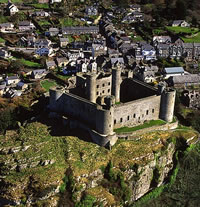
I spent yesterday in Harlech [ˈharlɛx] with a friend looking round the castle, exploring the village and wandering along the beach. We wondered where the name Harlech comes from, so I thought I’d find out. According to Wikipedia, there are two possible sources: from the Welsh ardd (high; hill) llech (stone) or from hardd (beautiful) llech (stone). Apparently it was referred to as ‘Harddlech’ up until the 19th century in some texts, so the second derivation might be more likely.
The word ardd is not used in modern Welsh – high is usually uchel and hill is bryn. There are cognates in the other Celtic languages: arth (hill) in Cornish; arz (high) in Breton; ard (head; ascent; incline; high; height; senior; advanced) in Irish; àrd (high, lofty, tall; great; loud; chief, eminent, superior, supreme) in Scottish Gaelic; and ard (high, towering, tall, big, loud, height, high place, fell, incline) in Manx.
These all come from from the Proto-Celtic *ardwos (high), from the Proto-Indo-European *h₁rh₃dh-wo- (high, steep), which is also the root of the Latin words arduus (lofty, high, steep, tall, elevated) and arbor (tree, mast, javelin), the Ancient Greek word ὀρθός (orthós – straight), the English word arduous, [source].
That’s interesting to know. I like the song Men of Harlech.
Hardd + llech is the derivation I have seen before. But it is interesting to know that Welsh has (or had) a cognate with Irish ard.
I also just learned the origin of lambeg (for those that don’t know: a large drum used in marching bands in Northern Ireland). The name comes directly from the village of Lambeg, Co. Antrim. What is interesting is that Wikipedia gives its derivation as Irish lann beag, meaning ‘little church’. The first element is obviously cognate with Welsh llan, but is it an ‘indigenous’ Irish word or is it a borrowing, perhaps through Scots Gaelic, from Old Northern Welsh (Cumbric)? The Lan-/Lam- element is not frequent in Irish placenames.
For the most part, the equivalent element to Welsh Llan- (meaning ‘consecrated ground’, ‘shrine’, ‘church’, ‘place with a church’) in Irish placenames seems to be Kil- (Irish Cill). Does Welsh have a cognate with cill?
The Irish lann comes from the Old Irish lann (building, house; land, plot; plate), from the Proto-Indo-European *lendʰ- (land, heath) and is cognate with Welsh llan [source].
The Irish cill means “cell (of a hermit), church, burial place” and comes from the Old Irish cell (church), from the Latin cella [source] (a small room, a hut, barn, granary;
the part of a temple where the image of a god stood; altar, sanctuary, shrine, pantry). The Welsh cognate of cill is cell, which also comes from the Latin cella [source].